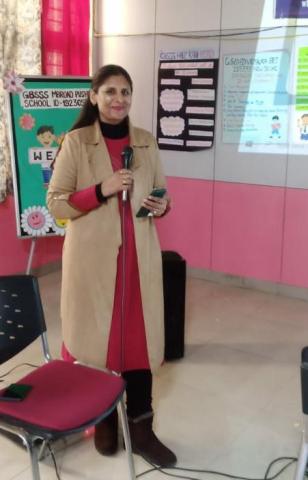
Simplifying Science: Bridging the Language Gap for Students
Written by Kiran
"SCIENCE IS A WAY OF THINKING, MUCH MORE THAN IT IS A BODY OF KNOWLEDGE" – Carl Sagan
What existed in human contemplation for centuries, science brought to reality. Scientific inventions have overwhelmed human life, whether it was the use of iron tools some 3500 years ago that led to the rise of empires or steam-enabled engines that drove the industrial revolution in the 19th century, paving the way for modern democratic lives across the globe. Science is an integral part of our lives. Without science, we can't imagine our life today; it is all around us, or we can say that our day-to-day life revolves around science.
The study of science is considered an important step for human progress and innovation. Today, many students find themselves dealing with a common fear of using scientific and technical terms to gain scientific knowledge. Students become anxious during the study of science subjects because they have the impression that, for science, a student must have a good understanding of the concepts and basics, which is very difficult to grasp. One of the primary reasons students fear science subjects is the belief that they need to learn large amounts of terms and formulas. They have to put in a lot of time and hard work, which is somewhat true. Science vocabulary is also found difficult to understand by the students. However, the key to overcoming this fear lies in going for conceptual understanding and not only rote learning by the students. Teachers must encourage and motivate students to inquire and explore the underlying principles. Students should be able to relate scientific phenomena to real-life applications and situations, not just limiting it to the walls of the classrooms.
Studying science should be an enjoyable journey of exploration and learning. With the right understanding and motivation, any student can do well in science with joy and without having science anxiety. A study revealed that the causes of science anxiety involve content, difficult terms, and science vocabulary that make the subject difficult to understand. The study also showed that science anxiety affected students' academic performance, reduced their interest in science, and prevented them from pursuing science courses in the future. Students experience science anxiety most of the time and sometimes even when lessons are in progress. They feel unable to comprehend the knowledge given to them and thus feel lost. They get scared that the teacher may ask them questions which they can't answer.
Teaching and learning require language, and in science, the language has to be precise and also acceptable globally. When students understand the science vocabulary, teachers can explain concepts to students with ease by asking students questions to check their understanding. Students will also be able to participate in discussions and ask their doubts to make basics strong. In a science class, students feel they are exposed to some alien language, so they find themselves disconnected. Many students have completed their primary education in their mother tongue, and the transition to difficult science terms becomes a nightmare for them.
Science vocabulary in the classroom includes technical terms, scientific terms, and non-scientific words. Situations that cause difficulty in the classroom can be when a term has both a scientific and non-scientific meaning, and the two meanings are different. Another situation could be students having misconceptions about the term, which the teacher is unaware of. Science is a specialist language with a group of complex words. These words are generally derived from Greek and Latin roots; they have prefixes and suffixes, making them longer words. To make a science term more specific, they are used as noun phrases and not a singular word like 'fossil fuels' or 'synthetic carbon compounds,' further creating a vocabulary hurdle for students.
The language of science is uniquely challenging for our students because the words are typically bigger, harder, and separate from the daily lives of our students. When a teacher enters the science classroom to speak, write, and introduce new scientific language to students, it can cause considerable confusion, particularly when the students may have established a different understanding of the terms from their everyday use. Careful thought needs to be given to the selection of new scientific terms, the choice of language used in definitions, and the prior understandings by the students.
In science, the language of communication needs to be more precise and consistent. Science often introduces technical words with specific meanings and also gives scientific meaning to words that may have different usage in everyday language.
For young children, being able to identify a process, event, or group of objects with a precise scientific term is often a very overwhelming experience. Students need opportunities to practice the patterns of language used to talk and write about scientific knowledge and scientific processes and skills. In science classes, students are frequently asked to 'estimate,' 'measure,' 'observe,' and 'describe' events and substances. It should not be assumed that all students have a clear understanding of what these terms require them to do or have established language patterns that allow them to do this effectively.

Many science vocabulary terms become increasingly more difficult to pronounce, let alone understand. As most of the scientific vocabulary has Greek and Latin roots, teachers can teach etymology (the history of the word) and the morphology (the study of word parts) of scientific terms to make it easy to understand by the students and use the terms appropriately. By breaking down the words, teachers can address misconceptions and connect science concepts. In an effort to make science vocabulary easy to understand and familiar, I introduced "TERM OF THE DAY," which brought a simple definition in both English and Hindi along with a pictorial description of important scientific terms. Students started looking forward to the Term of The Day and also started recognizing them in their textbooks.
For disadvantaged students in particular, it is important to place literacy at the center of science teaching so that the language of science does not prove a barrier to success. If a teacher can pay close attention to the vocabulary barrier in science, then students will find it easy to cross the hurdle of difficult science terms, and they will reap the benefits.
- Log in to post comments
